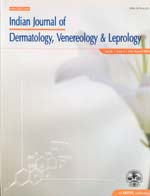
|
Indian Journal of Dermatology, Venereology and Leprology
Medknow Publications on behalf of The Indian Association of Dermatologists, Venereologists and Leprologists (IADVL)
ISSN: 0378-6323
EISSN: 0378-6323
Vol. 73, No. 3, 2007, pp. 162-165
|
 Bioline Code: dv07059
Bioline Code: dv07059
Full paper language: English
Document type: Research Article
Document available free of charge
|
|
|
Indian Journal of Dermatology, Venereology and Leprology, Vol. 73, No. 3, 2007, pp. 162-165
| en |
Vitiligo: A part of a systemic autoimmune process
Gopal, KVT; Rama, Rao GRaghu; Kumar, YHari Kishan; Appa, Rao MV; Vasudev, P & Srikant
Abstract
Background : Recent clinical and animal experimental studies postulate that the pathogenetic mechanisms of vitiligo could be of systemic origin as vitiligo is associated with ocular and auditory abnormalities as well as other autoimmune disorders.Hence, we studied genetic factors, systemic associations, ocular and auditory abnormalities of vitiligo.
Methods: The study group included 150 new cases of various types of vitiligo. One hundred age- and sex-matched nonvitiligo cases were included as controls in the study. A complete family history was taken for all patients. Examination was carried out taking note of the type of vitiligo and approximate percentage of body surface involved. All relevant laboratory investigations, a thorough audiological examination including pure tone audiometry and a complete ophthalmologic examination were carried out in all patients and controls. Statistical analysis was done using the Chi square test.
Results: Fifty-four vitiligo patients (36%) had a family history of vitiligo. Anemia was present in 30 (20%) vitiligo patients but only in five (5%) controls, a difference that was statistically significant (χ 2 = 15.8, P < 0.001). Diabetes mellitus was present in 24 (16%) vitiligo patients and only 2 (2%) of controls (Chi square, χ2 = 12.4, P < 0.001). Hypothyroidism and alopecia areata were present in 18 (12%) and 11 (7.4%) vitiligo patients respectively and none of the controls. Hypoacusis was seen in 30 (20%) vitiligo patients and two (2%) controls (χ2 = 8.19, P < 0.005). Twenty-four vitiligo patients (16%) and five controls (5%) had specific ocular abnormalities like uveitis, iris and retinal pigmentary abnormalities (c2 = 7.39, P < 0.001).
Conclusion: This study demonstrates statistically significant clinical evidence confirming that vitiligo is a part of systemic autoimmune process.
Keywords
Systemic disease, Vitiligo, Autoimmune
|
| |
© Copyright 2007 Indian Journal of Dermatology, Venereology and Leprology.
Alternative site location: http://www.ijdvl.com
|
|
